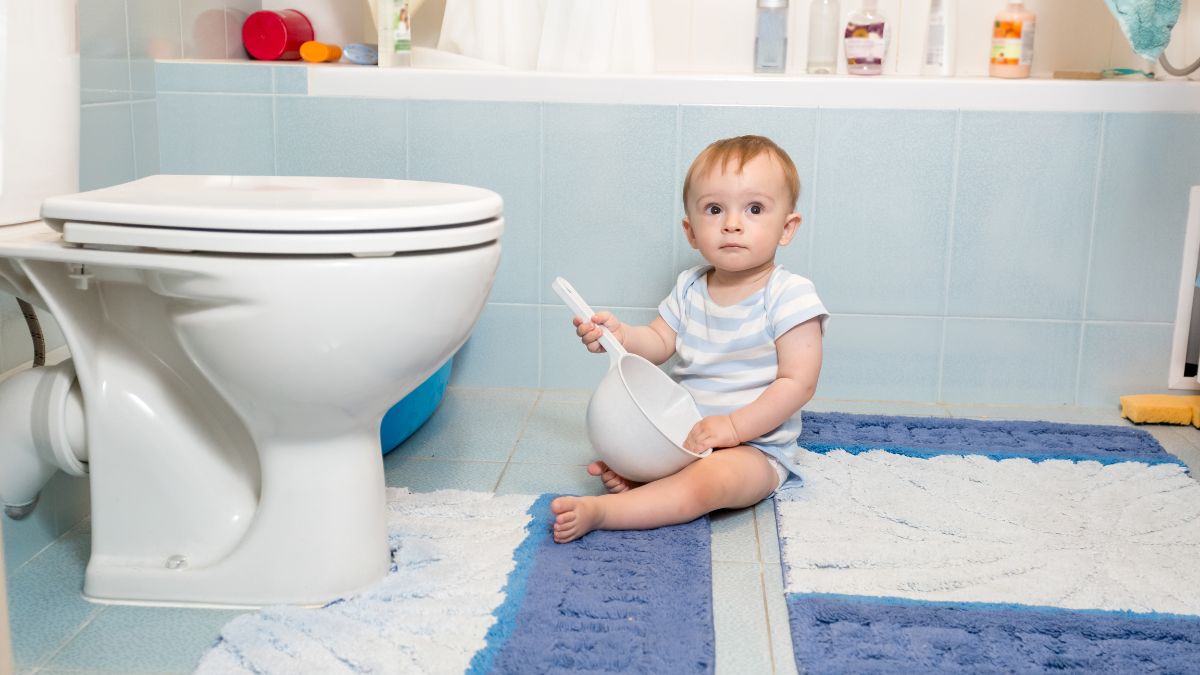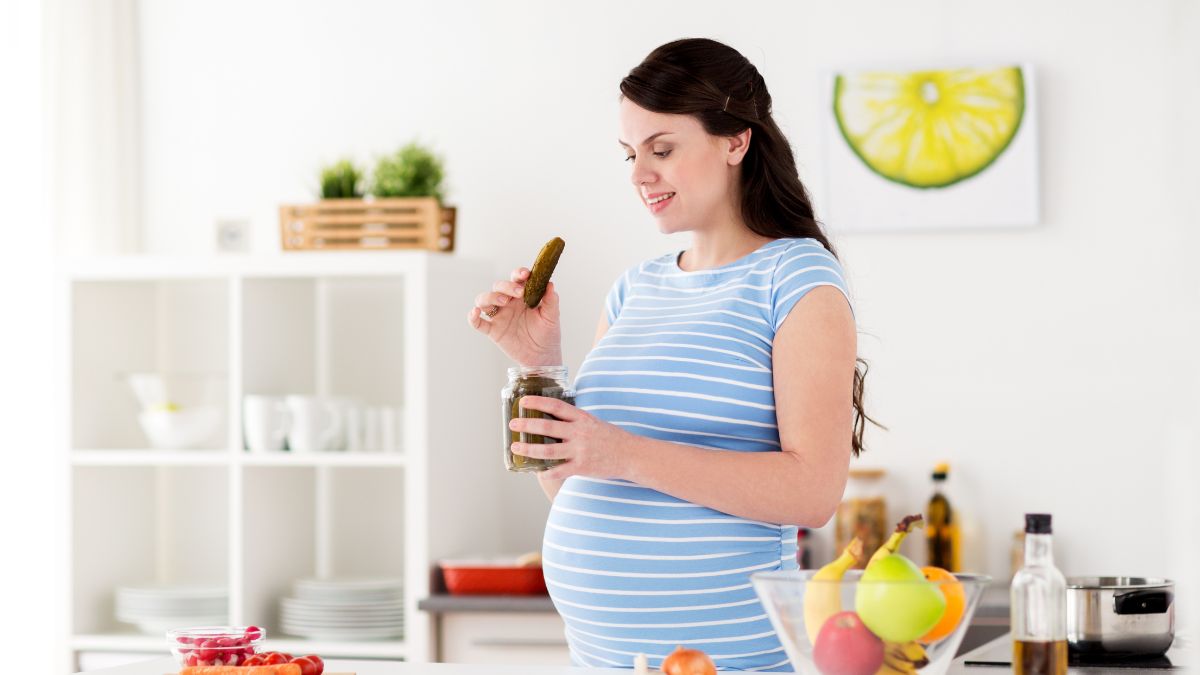Ever caught yourself in the middle of an intense diaper-changing marathon, pondering if this could be a sign of your munchkin sprouting a new tooth?
You might have heard of the ongoing debate among parents and pediatricians alike: Can teething cause diarrhea?
This article aims to dive deep into the teething diarrhea symptoms, uncovering the truth about this conundrum!
Decoding the Teething Puzzle
Every baby is different, and so are their teething experiences.
The process of those little pearls breaking through the gum line can commence anywhere between 4 to 12 months.
The teething timeline varies — some babies might even surprise you by being born with their first teeth!
Common symptoms of teething include:
- An insatiable urge for biting and sucking
- Tender, sensitive gums leading to a cranky baby
- Increased salivation, leaving their shirt drenched
- Redness around the mouth, chin, and cheeks due to constant drooling
- A slight rise in temperature, although anything above 100.4°F (38°C) should be treated as a fever, not related to teething.
Unmasking Diarrhea in Babies
Getting up close and personal with your baby’s poop is part and parcel of parenthood.
A breastfed baby’s stool is usually yellow, soft, and runny with a mild smell.
On the other hand, formula-fed babies tend to have thicker, brownish poop, not particularly pleasing to the nostrils.
However, when the diaper duty takes a dramatic turn—increased frequency, volume, and consistency of stools—it’s time to suspect diarrhea.
The color of the poop might also change to a darker shade or turn green, accompanied by a noticeably repulsive odor.
The Big Question: Is Diarrhea a Sign of Teething?
In a quest to unravel the mystery behind teething diarrhea symptoms, it’s essential to understand that teething, in itself, doesn’t cause diarrhea.
If you were looking for a simple cause-and-effect relationship, you may be disappointed.
However, there is a correlation between teething and diarrhea, albeit an indirect one.
The Culprit: Anything and Everything
Babies resort to biting and chewing to soothe their tender gums during teething. This often means they end up gnawing at anything and everything within their reach.
The habit of putting various objects in their mouth exposes them to a myriad of germs and potential bacteria-causing diarrhea.
Therefore, ensuring a clean and clutter-free environment for your teething tot can help prevent the onset of diarrhea.
Immunity and Teething: The Connection
The teething phase usually aligns with the period when infants encounter various illnesses due to their underdeveloped immune systems.
Therefore, the overlap of symptoms from these illnesses with teething often leads to the misconception that teething can cause stomach issues.
Dietary Changes: A Trigger
The teething milestone often coincides with the introduction of solid foods into a baby’s diet.
This dietary shift can lead to sensitivity or allergies towards certain foods, resulting in a change in their stool consistency.
Babies also tend to increase their fluid intake during teething, which could result in looser, watery stools.
Teething Diarrhea: Duration and Treatment
The duration of diarrhea during teething can vary. If diarrhea persists for more than a few days, it’s crucial to seek medical advice.
The most significant concern with ongoing diarrhea is the risk of dehydration.
If you suspect your baby is dehydrated, watch out for these signs:
- Less than six wet diapers in a day
- Crying with little to no tears
- Dry mouth
- Sunken soft spot on the baby’s skull
- The baby seems less playful and more fussy
Teething Diarrhea Remedies
To treat diarrhea, ensure the baby stays hydrated. Continue to provide breast milk or formula as usual.
If they are over six months, you can give your baby sips of water or an oral rehydration solution throughout the day.
Relief from Teething Discomfort
To ease the teething pain, you can:
- Massage your baby’s gums with your finger or a washcloth dipped in cold water
- Let your baby chew on a chilled teething toy, cold spoon, or chilled fruit in a mash feeder
- Use over-the-counter pain medication for infants, if necessary
Remember, teething tablets, topical gels, and homeopathic remedies are not recommended by the Food and Drug Administration due to potential safety hazards.
Related: 10 Home Remedies for Soothing Your Teething Baby at Night
Frequently Asked Questions (FAQs)
How long does diarrhea last when teething?
If your baby is experiencing diarrhea for 3 days or more, you’re going to want to have a pediatrician examine them. Although teething isn’t a direct cause of diarrhea, habits babies create while teething could cause other medical issues.
What color is teething poop?
Often, the stool of a teething baby becomes yellow and watery during teething. If the poop stays watery for more than a day, it’s a good idea to contact your doctor because it might indicate an infection.
When should I worry about diarrhea in babies?
If your kid is throwing up, has diarrhea, and isn’t drinking any fluids, it’s time to see the doctor. Also, go to the doctor if they’re having a lot of diarrhea—either 8 to 10 watery poops or 2 to 3 big ones daily—or if the diarrhea doesn’t get better after 10 days. If they’re vomiting and can’t keep any liquids down, that’s another reason to consult a doctor.
Wrapping it Up
The teething phase can be a challenging time for both the baby and the parents. While it does not directly cause diarrhea, certain factors associated with this phase might trigger loose stools.
Being aware of teething diarrhea symptoms and knowing how to treat diarrhea from teething can help you navigate this period with ease.
However, if your baby’s diarrhea persists or is accompanied by other symptoms such as fever, it’s essential to consult a healthcare professional.
While teething is a natural process, diarrhea can sometimes indicate an underlying issue that requires medical attention.
Remember, every baby is unique and experiences teething differently. So while the teething stage might seem daunting, it won’t last forever.
Before you know it, you’ll see those adorable pearly whites peeking out when your baby gives you their heartwarming smile—it’ll all have been worth the effort!








